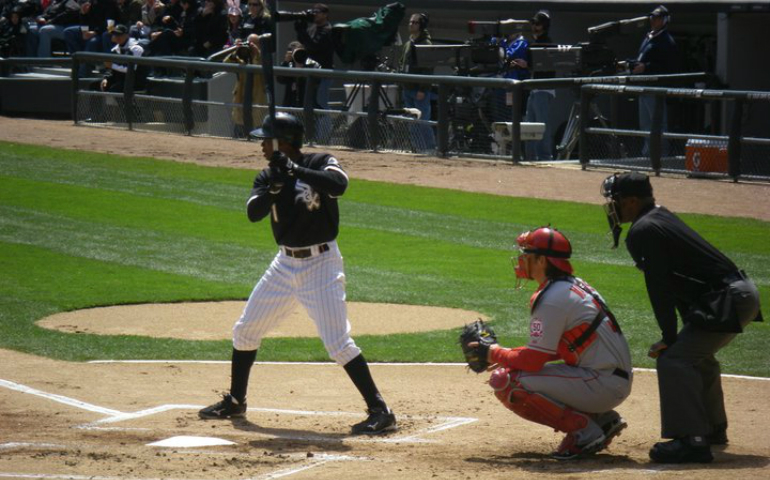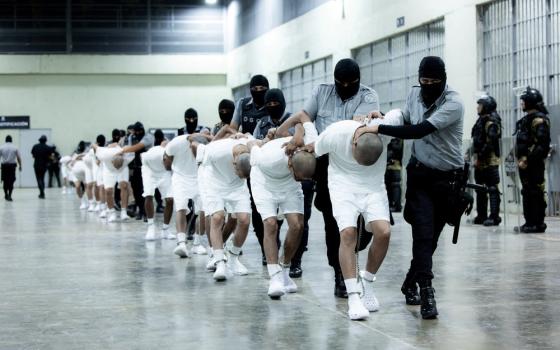
There are three types of umpires. Chicago White Sox vs. Cleveland Indians, at then-U.S. Cellular Field, Chicago, Illinois, 2011 (Mark Piper)
The tulips are out. Baseball has begun. I've just made it through another Lenten journey and am now in the joyous Eastertide. As it has been for many years, the journey was an easy transition. However, when I was 6, I had my first theological debate-turned-crisis, which ruined my Lent that year.
Now the theological debates I read about or think about (e.g. family issues around Amoris Laetitia and the dubia) are vastly different than my first foray into the thorny, murky, gray-area that can be for some utterly boring yet for others positively enraging.
I grew up in an idyllic small Wisconsin town where I attended St. Ann Elementary School. One Ash Wednesday, the parish priest visited our first-grade classroom. He attempted to catechize a bit about Lent, though I did not pay close attention because I found it hard to understand what was being spoken through his thick Irish brogue. Yet I heard one point very clearly, the word "alleluia" was not to be used in Lent. In fact we were to abstain from saying it until Easter Sunday. I didn't catch the reason why (exiling the word of praise during the penitential season) but it didn't matter; I heard I could not use the word, and I wasn't about to tempt God — or Father.
Let's skip ahead to the fourth week of Lent. After school, we headed for the not-so-aptly-named angel choir rehearsal, where I'm told by Mrs. Smiley the music liturgist that we are to practice the alleluia for the Easter morning children's Mass. When she said this, I was confused, and then I was as impetuous as St. Peter. "We can't!" I stammered. Perplexed, she asked why. "Because Father said we cannot sing the a-word until Easter Sunday."
At first, she probably thought I was being adorable, but she soon realized I took those words very literally. She went on to explain that practicing for Easter Sunday was not breaking the rule that Father spoke of, but in my 6-year-old wisdom, I remained unconvinced. So I eventually and reluctantly mouthed but did not sing "alleluia." I trusted Fr. Healy and I trusted Mrs. Smiley, but how could one say, "Do not sing Alleluia" and the other say, "It's ok to say it in practice?" They cannot both be right. Right?
Twenty-plus years later, I think of that little Lenten episode whenever I read about the latest hot-takes on Pope Francis. The Eastertide usually coincides with the beginning of baseball season, which reminds me that though the theological questions may change, much like the rosters in the major league, the umpires do not. In fact, there are three types of umps on the field of play and in the church.
The first umpire says, "There are balls and there are strikes. I call them as they are." The second umpire says, "There are balls and there are strikes. I call them as I see them." The third umpire says, "There are balls and there are strikes, but they are nothing until I call them." When I had my theological crisis over singing "alleluia" in first grade, I was very much the first umpire. I took quite literally that I could not say "alleluia," and so it was a ball, clearly outside what I thought was the strike zone. Looking back, I feel a bit differently about that.
As for current theological debates, including those that have folks incensed at times, I think the angst stems from the fact that we are all terrified of the third type of umpire, though from time to time we pine for that power, despite knowing it is a hubris-filled endeavor.
Some folks may yearn to have only umpires who call balls and strikes, as if there's no level of judgment or discernment at work when the ball isn't in the middle of the strike zone. And getting rid of umpires and just using instant replay cameras would change if not kill the game. Yet thanks to video replay, we know that no umpire calls every pitch correctly.
At my current station in life, that of "young adult," I'm solidly behind the notion of the second umpire, because, like a well-formed conscience, we have to call balls and strikes as best we see them. Sometimes we may get it wrong, but we recognize we have to have some level of integrity to determine if the pitch is indeed a ball or a strike; reality can be clouded by bias or perception. I think some people are afraid of this second umpire, too, concluding that "calling them as you see them" may be a slippery slope or even code for relativism. I don't think that's the case, and certainly that is not how I live it out.
The theological debate about practicing the Easter alleluia during Lent seems like child's play compared to some of the topics debated today: married priests, female deacons, Communion for the divorced and more. We could be spinning into infinity trying to resolve some of these issues, knowing that the church, like any baseball diamond in America, is comprised of two if not three types of umpires.
I'm not sure where the safe money is, but I'd wager more than a few seasons will pass long before some of these debates are settled and ensconced in tradition. In the meantime, I'll just keep singing the alleluia until Lent rolls around again.
[Mark Piper, a Packers fan in an unholy land, works in the nonprofit sector. He resides in Chicago with his family and holds a master's in public policy from DePaul University and a bachelor's from Saint Xavier University; he is an alumus of Amate House, an AmeriCorps-approved year of service organization sponsored by the Chicago Archdiocese.]
Editor's note: We can send you an email alert every time a Young Voices column is posted to NCRonline.org. Go to this page and follow directions: Email alert sign-up.




